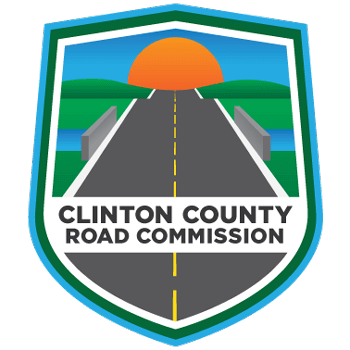
Stormwater runoff is created when rain falls on pavement, buildings, and other impervious surfaces that do not allow water to soak into the ground. In developed areas of Clinton County, we limit flooding by moving this runoff from our roads, parking lots, and neighborhoods through storm drains which discharge directly into rivers and streams. Since the discharge from separate storm sewer systems does not get processed at a treatment plant, any contaminant on the ground can “hitch a ride” with runoff and impact our shared surface waters. Pet waste, oil, leaves, and dirty water from cleaning your car can enter storm drains and flow downstream where it harms aquatic habitats and makes water unsafe for swimming, canoeing and other water-related activities. The Clinton County Road Commission (CCRC) takes steps to reduce this pollution to improve water quality and to meet State and Federal requirements.
Per these requirements, the CCRC must apply for a stormwater discharge permit every five years. A large part of that application consists of a description as to how the CCRC will commit to and proceed with the development, implementation, and enforcement of practices to reduce the discharge of pollutants from its municipal separate storm sewer system to the maximum extent practicable. This documentation was designated as the Clinton County Road Commission Stormwater Management Plan, which is located below for public review and input.
To help facilitate a regional approach to stormwater management, the CCRC is also a member of the Greater Lansing Regional Committee for Stormwater Management, a guiding body comprised of Municipal Separate Storm Sewer System (MS4) communities within the Greater Lansing Region. The committee has been established to guide the implementation of the stormwater program for participating communities within the Grand River, the Red Cedar River and the Looking Glass River watersheds. Visit MyWatersheds.org to learn about upcoming events, find steps you can take to limit water pollution, and to get involved in managing our shared water resources!
If you have questions or comments regarding the CCRC’s stormwater management plan, please contact Marc Trotter at 989-668-0044 or trotterm@ccrc-roads.com.
An illicit discharge is defined as any discharge to the municipal separate storm sewer system (MS4) that is not composed entirely of stormwater, except for discharges allowed under an NPDES permit or waters used for firefighting operations. Many of these non-stormwater discharges occur due to illegal connections to the storm drain system from commercial, residential, and other establishments.
Illicit discharges and dumping allow contaminated wastewater into our local waterways. Such activities may be intentional, but also may be unknown to the property owner. Some examples of illicit discharges or dumping are failing septic systems, improper disposal of sewage from recreational vehicles, illicit connections of sanitary sewer lines to the storm sewer system, or the cleaning of pool filters, paint brushes, and vehicles in a driveway or street.
Please help us protect the Looking Glass and other watersheds by reporting illicit discharges and dumping into Clinton County’s storm sewer system. You may call CCRC Director of Engineering Marc Trotter at 989-668-0044, or the Clinton County Drain Commission at 989-224-5160. You may also contact the Michigan Department of Environmental Quality’s Pollution Emergency Alerting System (PEAS) at 800-292-4706.
For more information on local water quality efforts, view the GLRC’s quarterly newsletters and annual reports.
Want to learn more about how you can protect our waterways at your home, school, or business? Check out these articles, brochures, and flyers and feel free to print and post them at your workplace or classroom!
Visit the GLRC website at www.MyWatersheds.org for more materials like these, to discover what watershed you live in, and other pollution prevention tips!
Protect our shared water resources by properly disposing motor oil, fertilizers, and other house hold hazardous waste. Visit these links to learn how different materials should be disposed of and for a calendar of local waste collection events:
https://www.clinton-county.org/345/Hard-to-Recycle-Dispose-of-Materials
https://www.clinton-county.org/314/Current-Events
Want to learn more about watershed management and how you can help reduce pollution in our local waterways? Visit: https://www.mywatersheds.org/for-homeowners
557